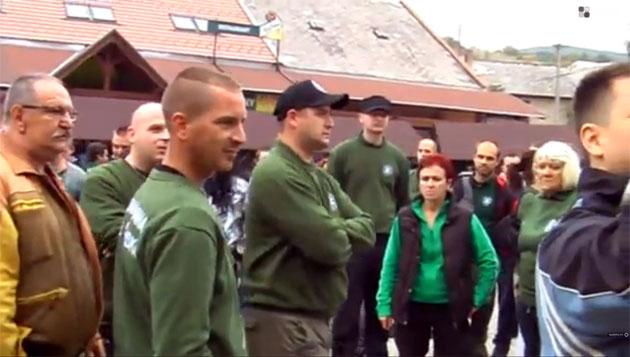Slovak municipality orders construction in Romani settlement demolished

The village of Krásnohorské Podhradie in eastern Slovakia has ordered the demolition of an illegally constructed house in the local Romani settlement which is standing on a plot of land co-owned by right-wing extremist leader Marian Kotleba. The municipal decision may become a precedent not only for other illegal constructions in the locality, but also for dwellings in similar settlements throughout the country.
After a fire last year at the nearby Krásná Horka castle, the village near Rožňava drew the attention of right-wing radicals. The fire spread to the castle from the surrounding brush at the bottom of the hill on which it stands, seriously damaging the structure, and was allegedly started by two Romani boys.
Kotleba was subsequently gifted a plot of land in the local Romani settlement by its original owner. Last fall, Kotleba summoned his hangers-on to come to the village in order to "clear" the settlement; the event took place without incident, as police did not permit the right-wing radicals to enter the municipality.
The Darvaš family, who have resided in the home in question on what is now Kotleba’s land for roughly 17 years, has requested that the authorities legalize their construction. The municipality decided to reject their request and ordered the home to be demolished within one year.
"Given that the applicants did not submit the [requested] documents by the deadline, the Building Works Authority has halted the proceedings for retroactive permission," the municipality said in a decision issued during the final week of June 2013. Those requesting retroactive permission for construction in Slovakia must submit, for example, project documentation and prove they own the land on which the construction stands or that they are entitled to its use for some other reason. If they do not do so, the Building Works Authority is entitled by law to order the construction removed, as has happened in this case.
The owners of this house intend to appeal this decision. "I will sue over this decision. I will not allow them to demolish it," Štefan Darvaš told Slovak Radio.
Legal aid has reportedly been offered to Darvaš by the European Roma Rights Centre. The case will be important for other similar constructions in the country as well.
There are roughly 700 settlements in Slovakia where Romani people often live in unsuitable conditions. Many dwellings have sprung up in these places without the necessary permits on plots of land owned by others.
Official statistics show that around 105 000 Romani people now live in Slovakia. In reality, however, experts say many more Roma than that are residing in the country.